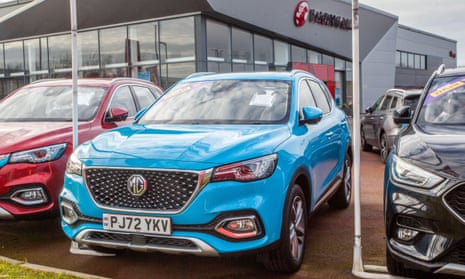
Make used electric cars cheaper and tackle battery fears, peers tell ministers
Grants needed towards buying EVs as well as a battery health testing standard to reassure consumers
Ministers need to intervene to boost the secondhand electric vehicle market and allay “uncertainty and concerns” over the health of their batteries, a House of Lords committee has said.
Peers on the environment and climate change committee urged the government to step up efforts to encourage electric vehicle adoption amid consumer jitters over the cost of vehicles, the longevity of their batteries and the availability of charging points.
Ministers should step in to tackle the disparity in upfront costs between EVs and petrol and diesel cars, and examine targeted grants to incentivise the purchase of electric cars, they said in a report. During their seven-month long inquiry, witnesses repeatedly called for a cross-industry battery health testing standard to provide “clear information and reassurance to consumers”.
The study raised concerns over the secondhand market as most vehicles available for resale are sports utility vehicles (SUVs) or cars costing more than £40,0000 sold on by businesses and early adopters of EVs, meaning they are “out of reach of most consumers”.
The peers said grants should be awarded to bring down costs to make the purchases cheaper and stimulating an “affordable” market, before the subsidies are then tapered away when electric- and fossil fuel-powered cars reach the same price.
There were 35.1m cars on UK roads in 2022, of which 650,000 were pure electric, the Society of Motor Manufacturers and Traders said on Monday, as the all-time number of electric cars sold in the UK passed 1m.
Efforts to reach net zero appear to have been undermined by a series of moves by the governing Conservatives as the prime minister, Rishi Sunak, vows to end “anti-car measures”. Last year, Sunak delayed the ban on new petrol and diesel car sales from 2030 to 2035, a major U-turn on previous climate commitments.
Announcing the move, Sunak said that achieving net zero “is going to be hard”. The Lords said: “By emphasising the costs while failing to stress the benefits and robustly counter misinformation, the government is not building public confidence.
“The concern the government expressed to us about the scale of misinformation has not been matched by commensurate urgency in tackling it. Faced with conflicting claims and alarmist headlines, consumers need a go-to source of comprehensive, clear and balanced information.”
Conservatives have also opposed the expansion of London’s ultra-low emission zone and low-traffic neighbourhoods.
The Lords report also recommended: planning regulations should be reviewed to “turbo-charge” the rollout of charging infrastructure; VAT rates should be cut for public charging to help those without access to off-street parking; and investment should made into UK battery recycling facilities.
Lady Parminter, the chair of the inquiry, said: “The evidence we received shows the government must do more to get people to adopt EVs. If it fails to heed our recommendations the UK won’t reap the significant benefits of better air quality and will lag in the slow lane for tackling climate change.”
The government has been approached for comment.